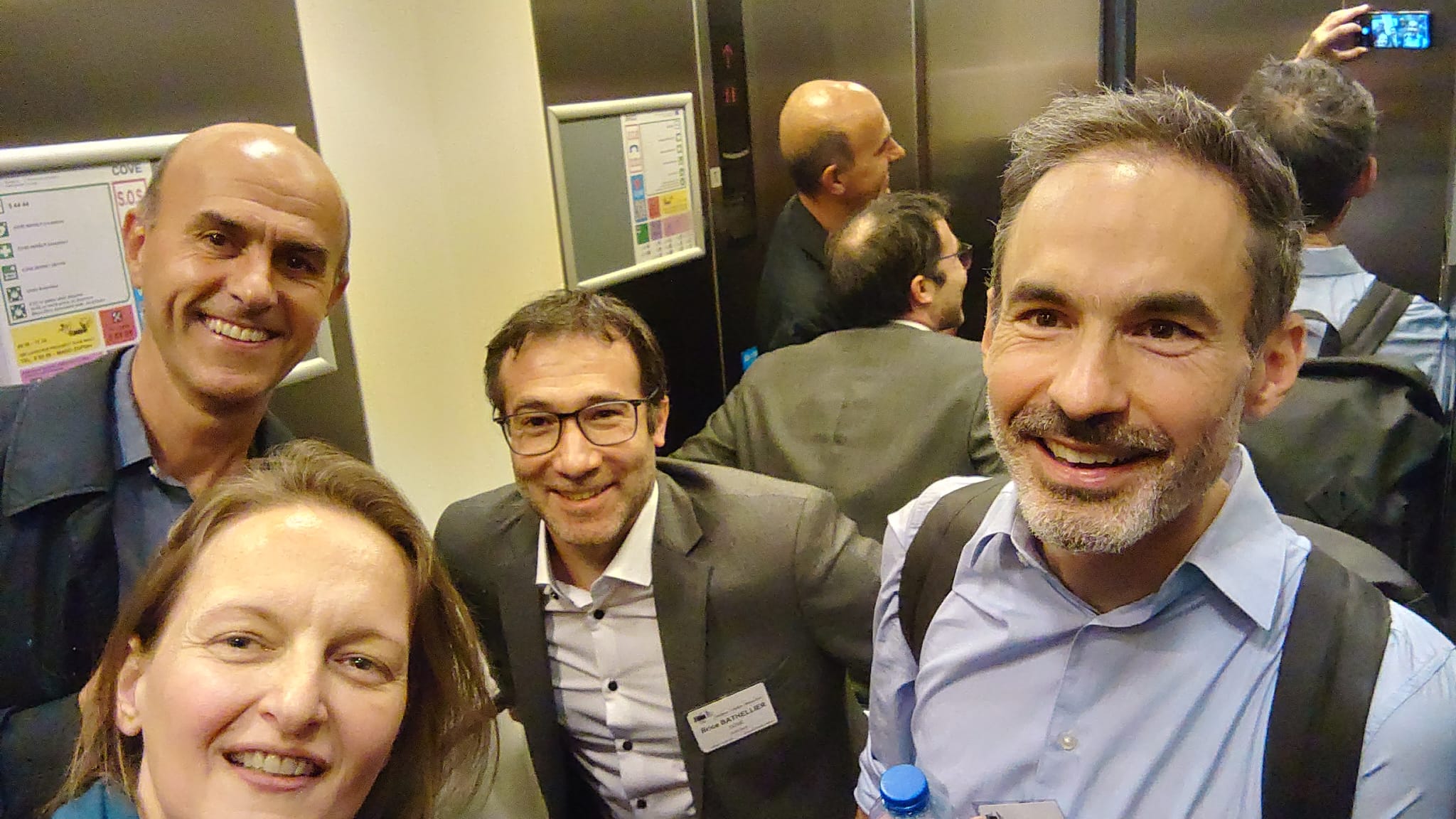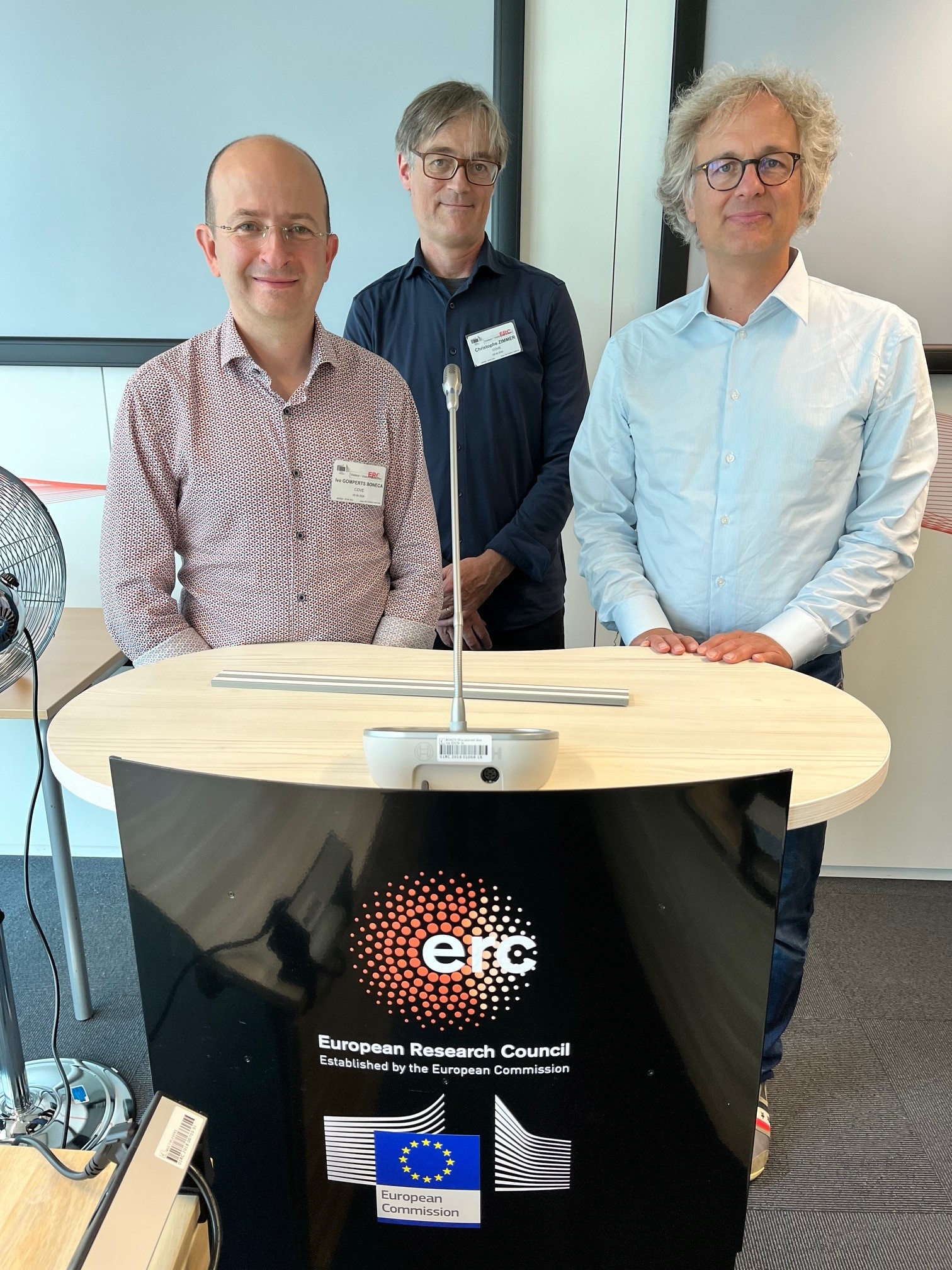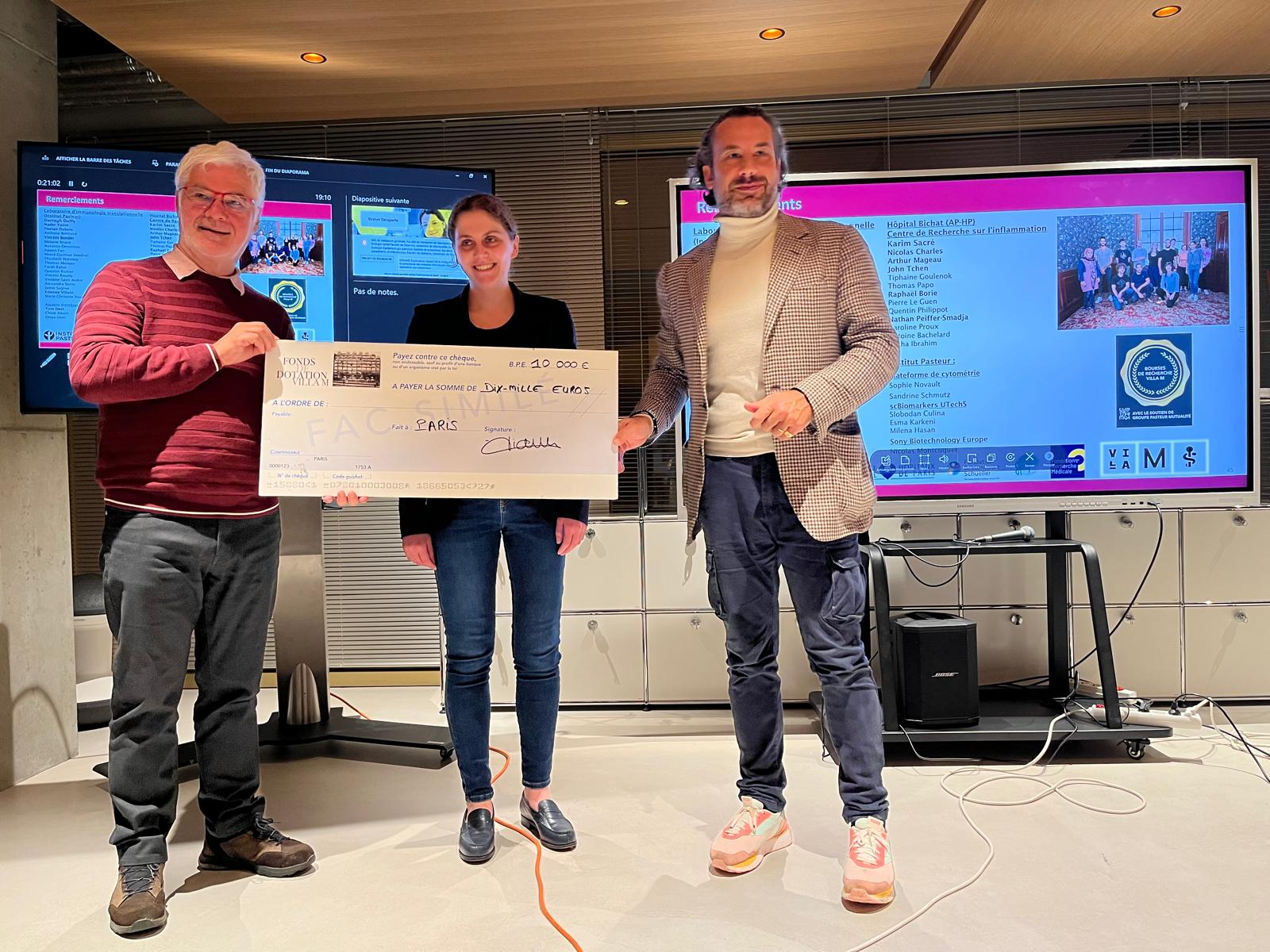
November 08, 2024
Bulletin interne de l'Institut Pasteur

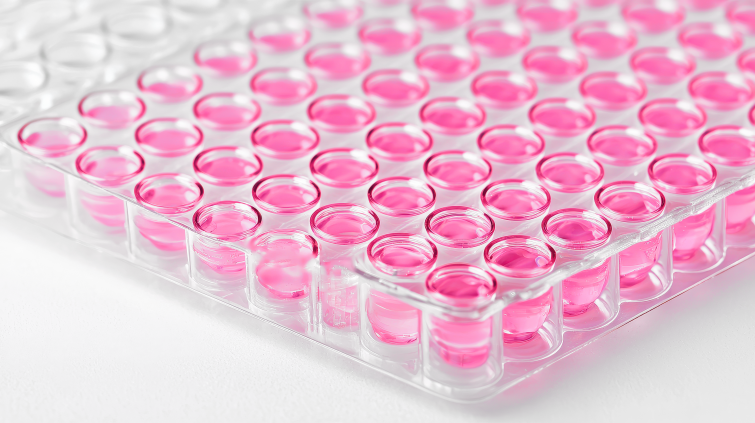
2024 ERC Synergy Grant, launch of the ProteoVir project, Villa M Awards: Institut Pasteur scientists recognized
- 2024 ERC Synergy Grants: Two Institut Pasteur scientists selected
Since 2012, the highly competitive ERC Synergy Grant has been aimed at teams of 2 to 4 researchers from EU Member States or associated countries who want to launch ambitious research programs at the frontiers of knowledge. The grants provide up to €10 million in funding for a period of 6 years. They are designed to give scientists the opportunity to tackle scientific questions that are too complex to be treated on their own, by adopting a collective and interdisciplinary approach.
This year, among the 57 projects selected (out of almost 548 submitted), two winners are Institut Pasteur scientists:
 Brice Bathellier, head of the Auditory System Dynamics and Multisensory Processing Unit, received funding for the project CHRONOLOGY - The geometry of temporal cognitive maps. The project will be carried out in collaboration with Srdjan Ostojic (ENS), Virginie Van Wassenhove (CEA) and Mehrdad Jazayeri (Massachusetts Institute of Technology).
Brice Bathellier, head of the Auditory System Dynamics and Multisensory Processing Unit, received funding for the project CHRONOLOGY - The geometry of temporal cognitive maps. The project will be carried out in collaboration with Srdjan Ostojic (ENS), Virginie Van Wassenhove (CEA) and Mehrdad Jazayeri (Massachusetts Institute of Technology).
Abstract
"Experiencing the world and inferring its causal structure rely on the flexible temporal organization of information in the brain, enabling future planning in thoughts and actions. Understanding how the brain maps events in time is essential, yet surprisingly little is known about the neural mechanisms by which the brain represents time and uses it for computations. Based on the observation that complex neural activity accompanies the mental evaluation of time across species, our project aims at testing the hypothesis that the collective dynamics of brain circuits involved in memory generate and organize representation of temporality. To identify the key structures of time representations in the brain, we will record neural activity at different neuroanatomical scales (from neuron to whole-brain) in three species (rodents, non-human primates, and humans) while individuals are behaving in timing tasks of varying cognitive complexity. A geometrical analysis of neural activity will determine the existence of temporal cognitive maps that provide individuals with a mental chronology of experienced events. We will test if the navigation of temporal cognitive maps is involved in tasks where individuals mentally travel in time. Exploiting state-of-the-art artificial intelligence methods to build interpretable recurrent neural network models, we will identify generic processes supporting the emergence of time representations by comparing signatures of theoretical mechanisms with brain activity. Targeted causal manipulation at the single cell resolution will help select precise mechanisms among model-based hypotheses, including the role of local and long-range neuronal connectivity in the establishment of circuit dynamics that develop across time scales. Our synergistic cross-disciplinary team will establish an innovative, biologically-grounded, overarching framework for the representation of time in the brain, its dependence on context, and its relation to memory."
 head of the Biology and Genetics of Bacterial Cell Wall Unit, received funding for the project AI4AMR - Deep learning analysis of imaging and metabolomic data to accelerate antibiotic discovery against antimicrobial resistance. The project will be carried out in collaboration with Christophe Zimmer (Universitat Wuerzburg) and Mark Bronstrup (Helmholtz Zentrum fur Infektionforshung GM).
head of the Biology and Genetics of Bacterial Cell Wall Unit, received funding for the project AI4AMR - Deep learning analysis of imaging and metabolomic data to accelerate antibiotic discovery against antimicrobial resistance. The project will be carried out in collaboration with Christophe Zimmer (Universitat Wuerzburg) and Mark Bronstrup (Helmholtz Zentrum fur Infektionforshung GM).
Abstract
"Antimicrobial resistance (AMR) is one of the most pressing global health problems of our times. To counteract AMR, we urgently need new antibiotics, particularly with novel modes of action (MoA). However, while typical antibiotic screening pipelines can identify compounds that impair bacterial growth, they are unable to predict drug targets and MoA so must be followed up by timeconsuming target identification steps. By synergizing our expertise in microbiology, genetics, advanced microscopy, metabolomics, medicinal chemistry, computational biology and artificial intelligence (AI), we propose to create a new pipeline at the forefront of the antibiotic discovery field that will be capable of informing simultaneously on the bioactivity and MoA of new antibiotic candidates. Working with seven pathogens, our improved acquisition strategies for both imaging-based high-content screening and metabolomics will generate a massive dataset of rich multidimensional phenotypes of libraries of genetic mutants and of bacteria exposed to a range of perturbants, at unprecedented scale. Deep learning analyses will then enable us to explore these massive datasets to correlate chemical-induced phenotypes to those from mutants, linking drugs to genes to elucidate the target/MoA of new drugs. This innovative pipeline will enable us to explore unique chemical spaces, including complex natural product extracts (without the need for isolation of individual components) and novel synthetic compounds. Promising candidates with novel MoA will be tested against drug-resistant clinical isolates and against a future pandemic 'pathogen X', demonstrating our pipeline as an AIpowered solution for achieving higher productivity in antibiotic discovery. AI4AMR will provide the community with a new pipeline to efficiently screen large compound libraries to identify novel antibiotics and define their MoA and target, helping directly to combat AMR."
- France 2030: Launch of the ProteoVir project to study proteins in each cell individually, taking into account their environment to tackle neuroinfections
In January 2024, as part of its France 2030 initiative, the French government launched a call for "High-Risk Research" programs. Alongside the CEA, Inrae, Inria and Inserm, the CNRS is one of five research organizations that decided to introduce a dedicated program in response to the call.
The CNRS "Risky and High-Impact Research" program, or (RI)?, is aimed at detecting basic or innovative research at a very early stage that could lead to conceptual, technological or strategic breakthroughs for France in the coming decades, amid international competition. Twelve projects were selected at the CNRS in connection with this program.
The government's "High-Risk Research" program, with a budget of €150 million, is the latest in a series of national programs, which also include the Priority Research Program and Equipment (PEPR) initiative, and is intended to open up new research fields. "High-Risk Research" focuses on ideas put forward by scientists or groups of scientists that could offer a new answer to a specific question. The CNRS is allocating the funding received under the program to projects with the potential to break down barriers and revolutionize one or more fields, but which represent somewhat of a gamble in funding terms.
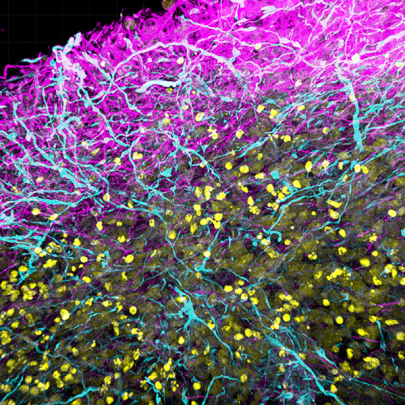 The 12 projects selected under the CNRS RI2 program include the ProteoVir project, co-led by:
The 12 projects selected under the CNRS RI2 program include the ProteoVir project, co-led by:
• Jean-Christophe Olivo-Marin, Head of the Institut Pasteur's Biological Image Analysis Unit,
• Raphaël Gaudin, Head of the Membrane Dynamics & Viruses team at IRIM (CNRS UMR9004),
• Myriam Ferro, Head of the ProFI infrastructure (CEA/CNRS).
The aim of the project is to develop a method for analyzing cellular proteins that conserves information about their micro-environment, with potential applications in medicine, virology research, neurobiology and beyond. The project jointly led by Jean-Christophe Olivo-Marin's team is at the intersection of spatial proteomics, artificial intelligence and viral infections. It will provide a uniquely in-depth analysis, and in the long term will pave the way for the establishment of personalized therapeutic strategies.
Find out more about the ProteoVir project (in French)
Find out more about the "Risky and High-Impact Research" program
- Villa M medical research grant: recognition for a Pasteurian woman
This year, Villa M awarded research grants to eight early career scientists in the field of health, with the support of Groupe Pasteur Mutualité. The 2024 laureates receive a medical research grant of €10,000.
They were all selected by the scientific committee of the Villa M endowment fund for the quality and excellence of their multidisciplinary research aimed at developing new therapeutic techniques that will benefit patients.
Villa M medical research grants are supported by Groupe Pasteur Mutualité and its constituent health insurance funds: GPM Jeunes Pros de Santé, GPM Hospitaliers, GPM Médecins de Paris and GPM Sud. The research grants are aimed at residents, chief residents, early career practitioners and/or scientists in health, in any specialty, to encourage outstanding scientific research, the development of international exchanges, health innovation and medical progress.
This year, one of the eight early career scientists in health, is a Pasteurian woman:
 Marie Robert, a PhD student in science at the Université Paris Cité and resident in the Translational Immunology laboratory co-directed by Dr Duffy and Prof Sacré (Hôpital Bichat, AP-HP - Centre de Recherche sur l'inflammation), is rewarded for her research project entitled “Integrative analysis of the role of monocytes and macrophages in SARcoidosis: from initiation of the granulomatous reaction to its maintenance”.
Marie Robert, a PhD student in science at the Université Paris Cité and resident in the Translational Immunology laboratory co-directed by Dr Duffy and Prof Sacré (Hôpital Bichat, AP-HP - Centre de Recherche sur l'inflammation), is rewarded for her research project entitled “Integrative analysis of the role of monocytes and macrophages in SARcoidosis: from initiation of the granulomatous reaction to its maintenance”.
Find out more (in French)
